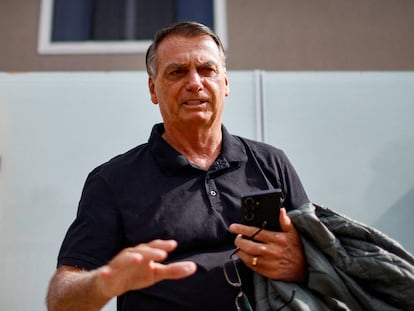Anatomy of Marielle Franco’s murder: the plot, assassination, red herrings and a sabotaged investigation
Two corrupt politicians and a police commissioner from Rio de Janeiro are arrested as the masterminds of the 2018 crime
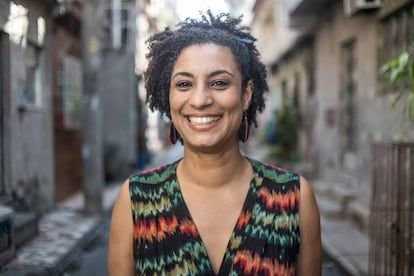

On Sunday, March 24, Brazil woke up to the news of the arrest of two veteran politicians and a former Civil Police commissioner from Rio de Janeiro, implicated in the 2019 murder of city councilor Marielle Franco. The arrest of the politicians was expected, but the commissioner’s arrest was not. Police believe these arrests will be crucial in finally solving the puzzle of this high-profile political assassination. The confession by triggerman Ronnie Lessa, a military cop turned hitman, spilled all the details about the murder plot and execution, and subsequent efforts to obstruct the investigation.
The motive
The murder motive was brewed from Rio’s noxious concoction of criminal real estate interests, political turmoil and corruption. Leftist city councilor Marielle Franco had gone after two corrupt politicians and brothers – João Francisco Brazão (a national congressman) and Domingos Brazão (an advisor to the Court of Auditors of the State of Rio de Janeiro). The brothers from Jacarepaguá (a sprawling Rio suburb) decide to retaliate against Franco for opposing their 2018 bill to legalize illegal construction projects.
The plot
The Brazão brothers hired Ronnie Lessa, a retired military police officer known for his sharpshooting skills, now working as a hitman. They also enlisted Rival Barbosa, then homicide chief of the Civil Police, to help plan the crime and coverup. Domingos Brazão emerged as a suspect early in the investigation. When Lessa decided to confess after five years in prison, he revealed that the Brazãos ordered him not to commit the crime near City Hall, as the political implications would involve the Federal Police. Everyone wanted the case to remain under Commissioner Barbosa’s local jurisdiction.
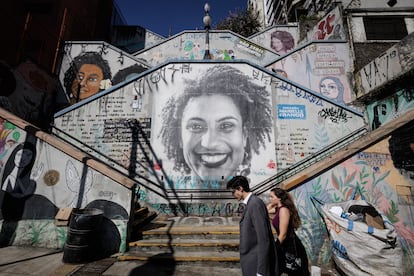
Lessa, who had lost a leg in a revenge attack, went to a remote ravine to test the submachine gun he would use to murder Franco. As payment, the Brazãos offered him some rezoned plots of land.
It’s no great shock that politicians and police in Rio de Janeiro are involved in illicit activities. The first samba ever recorded, Pelo telefone (By Telephone, in English), sang about this type of corruption in 1916 (available for listening in Brazil’s National Library).
The infiltration
The Brazãos hired a militiaman to infiltrate Franco’s political party and monitor her closely as they worked on their plan. In Brazil, a militiaman is a security forces agent who switches sides and joins a paramilitary force. Some retire from official duty first, while others work both jobs at the same time. They get government pay to protect the public while extorting and killing for organized crime groups.
Franco stood out in a city government dominated by white men. A Black woman raised in Maré, one of Rio’s large favelas (slums), she was the bisexual mother of a teenager, warrior against police abuse, and defender of LGBTQ+ rights. Her fellow councilors included João Francisco Brazão and Carlos Bolsonaro, son of the far-right ex-president, Jair Bolsonaro.
The assassination
On the night of March 14, 2018, Franco had just left a debate and was in a car driven by Anderson Torres. Sitting in the back with Franco was her press secretary. Torres navigates through traffic in downtown Rio, while Lessa follows in another car with his military police buddy, Élcio Queiroz. As they approach a curve, Queiroz pulls up next to Franco’s car. Lessa fires 13 bullets from the back seat. Four bullets hit Franco, killing her instantly. Torres is also killed but the press secretary miraculously survives.

From the outset, it was obvious that this wasn’t a typical murder, but a professional hit. The coverup and sabotage of the investigation geared up immediately. The surveillance cameras pervasive on Brazil’s streets weren’t working. And the day before the crime, Commissioner Barbosa was promoted from homicides to chief of Rio’s Civil Police.
The day after
Marielle Franco was a left-wing politician and a relative unknown beyond Rio. As the extreme right gained ground and corrupt police gangs strengthened their grip on Rio, the assassination garnered national media attention.
The day after the assassination, the new police commissioner received Franco’s shocked and grieving inner circle, offering false sympathy and promises. “He told my husband and me that solving the murder was a matter of honor,” Franco’s mother said earlier this week. At that meeting with Barbosa were Anielle Franco, Marielle’s sister and current Minister of Racial Equality; Marielle’s partner, Mónica Benicio, an architect who later became a city councilor, and Marielle’s political mentor. They all took Barbosa at his word, placing their trust in him.
The news of Barbosa’s arrest hit Franco’s family and friends like a nuclear bomb. “No one should die like that. Having the audacity to plan it, give the green light, then casually sit with my mom for coffee and promise to crack the case? What kind of world are we living in?” asked Anielle. The picture of the commissioner, sitting on a couch with Franco’s parents, has been widely circulated since the arrest.

Red herrings
“The Civil Police of the State of Rio de Janeiro has the jurisdiction, ability and credibility to provide the necessary response to this crime,” Barbosa solemnly proclaimed. Many people naturally doubted his words, and with good reason – Barbosa is now the fourth head of Rio’s police force to go to prison in recent years. The state has one of the lowest crime solving rates in the country. Barbosa began to feed an investigator some false suspicions that were noted in a confidential report. Then the case went cold for weeks.
A month after the murder, Barbosa planted a false witness — another military police officer — who implicated a city councilor and a militiaman in his testimony. A few media outlets reported the story, but an internal affairs investigation discredited this testimony and the witness later admitted to lying out of revenge. Evidence and suspects’ phones go missing from policy custody.
Tourists experiencing Rio de Janeiro’s vibrant Copacabana beaches and lively Carnaval celebrations rarely see the city’s dark underbelly. Behind the scenes lie entrenched mafia clans, an illicit lottery known as jogo do bicho, clashes between drug cartels and corrupt police factions, and much more. The resulting violence stemming from these turf wars and illegal enterprises is a grim everyday reality.
One year later
Franco becomes a rallying cry of unity for Brazil’s left after Jair Bolsonaro, a far-right, retired military officer from Rio, becomes president. Two days before the anniversary of the murder, Lessa and his driver were arrested following an anonymous tip.
The case then began to take a series of twists and turns. One prosecutor after another was assigned to the case, and two finally obtained a conviction of the perpetrators. In 2021, both resigned citing external interference. The case became a political hot potato.
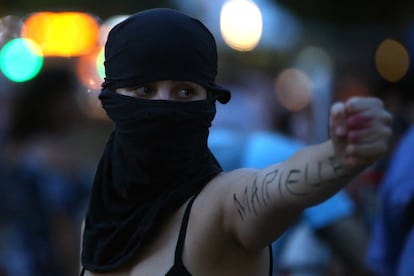
Small fry
Over the past six years, the police have arrested additional suspects linked to the murder. A fire department sergeant was jailed for providing the getaway car, concealing weapons, and aiding in their disposal. The owner of the workshop where the getaway car was dismantled was also jailed.
A new president
Luiz Inácio Lula da Silva beats Bolsonaro and becomes president. Lula appoints the Franco’s sister to his cabinet, and his new Minister of Justice, a former judge, immediately vows to get the Federal Police involved in the case. The new government promises results by the sixth anniversary of the murder, but the date comes and goes with no progress. The big break comes 10 days later.
Big fish
The hitman’s confession to the Federal Police reveals the masterminds behind Franco’s death. To prevent leaks, the Federal Police decide to arrest the trio on a Sunday morning. Shortly after dawn, the two shady politicians and trusted former commissioner are arrested in their homes.
For 2,002 days, many people have been wondering: Who killed Marielle? Who wanted her dead? And why? Now, some of them feel a sense of relief.
Powerful bosses
A look at the fine print of this murder reveals the considerable influence wielded by political figures in Brazil, no matter how tarnished their reputations. Domingos Brazão is serving a six-year suspension from his role at the Rio Audit Court due to a corruption scandal. Despite this, he continues to draw a hefty monthly salary from the court of almost $8,000, and recently won a legal battle entitling him to compensation for 420 unused vacation days, worth an additional $115,000.
In Brasilia, Congress continues to discuss the fate of João Francisco Brazão’s seat as both brothers are now in maximum security prisons. The president of the Chamber of Deputies lamely said, “It’s a difficult, sensitive case for all of us,” clearly showing that the distinguished legislators are terrified of setting a precedent. Every member of Congress has received a copy of the 479-page police report.
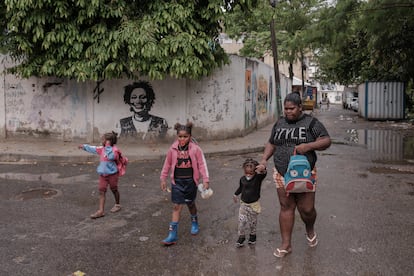
João Francisco Brazão, who was expelled from his party, joined a video call from prison in late March where his colleagues were debating what to do about his vacated seat. Brazão told them he had a positive relationship with Marielle Franco when both served on the Rio City Council, and that their disagreements were minor matters. He asked for his statement to be included in the official meeting minutes.
Sign up for our weekly newsletter to get more English-language news coverage from EL PAÍS USA Edition

